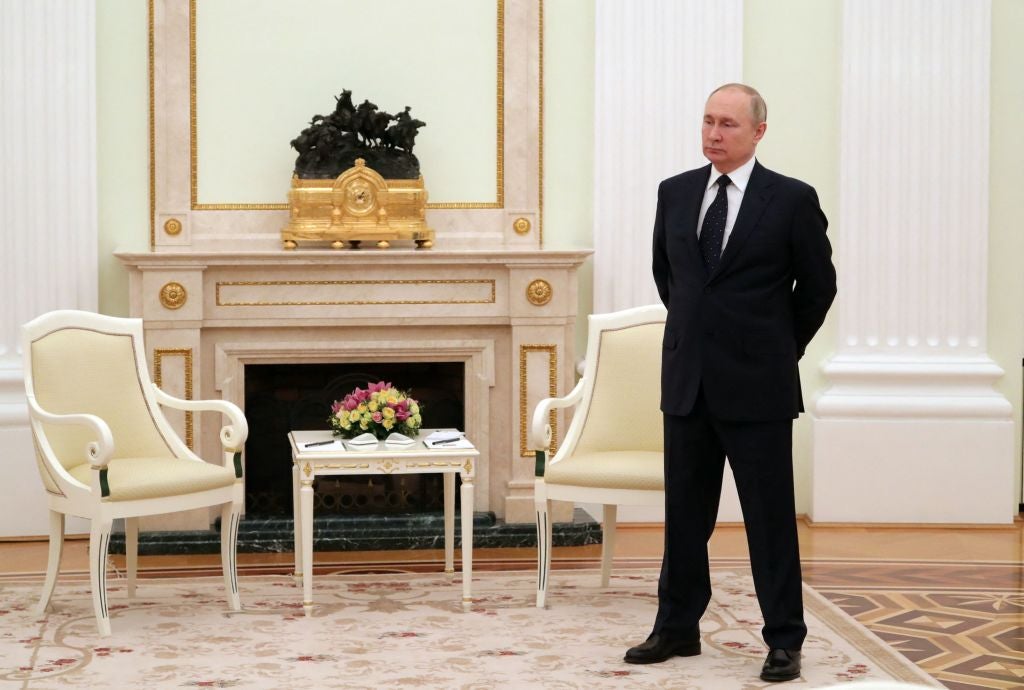Inspiring fear will only get Vladimir Putin so far – as Ukraine has proven
Sir Jeremy Fleming, the director of GCHQ, is clear about the position the Russian president finds himself in, writes Sean O’Grady


Sir Jeremy Fleming is the director of GCHQ, the UK’s intelligence, security and cyber agency. Like others in the western intelligence community, he appears to know more about Russia’s war in Ukraine than Vladimir Putin.
What’s more, he even claims to know why he knows more about the invasion than does the man who ordered it. In a speech given in Australia, Fleming said the Russian leader had misjudged the strength of Ukrainian resistance, the western economic and military response, and the ability of his forces to deliver a rapid victory. His strategic miscalculation in launching the invasion of Ukraine, Fleming explains, is partly because his advisers are “afraid to tell him the truth” about the extent of his error.
There is little reason to doubt Sir Jeremy’s analysis. Putin would not be the first Russian leader, or, indeed, autocrat anywhere, to be so feared by his top officers and closest advisers that they hesitate to tell him unpalatable truths. It can be a fatal problem. Many of Russia’s early failures in the Second World War, for example, were because Joseph Stalin was being told by his toadying diplomats that there was no chance of Adolf Hitler invading, and when some of his spies did pass on information about German intentions and tanks moving around he dismissed them, such was his confidence. Not until it was too late would Stalin understand that his forces were fighting poorly because he had ordered some of his best generals to be shot in a savage pre-war purge.
Something of the same seems to be been happening in Ukraine. The video a few weeks ago of Putin publicly humiliating his plainly terrified security chiefs suggests that the Russian president believes in the power of fear just as much as any of his predecessors. They will have been assuring him for weeks before the invasion that their lightning war would be over in a matter of days; that Volodymyr Zelensky would flee the country; an alternative government sympathetic to Russia was ready to snap into place; and that the Ukrainians were anxious to be liberated from their (so Putin has called them) Nazi overlords.
It is more than possible that Putin's advisers knew full well that such a rosy picture was fiction. There is certainly no suggestion of any internal opposition to Zelensky, and the invasion has of course made Zelensky hugely popular at home and abroad.
The problem for Putin is that if he sacks his advisers, they will be replaced by others equally frightened for their lives, because they know Putin's reputation. If they told Putin that his conscript army was poorly motivated and short of weapons etc, then they would only prove to him that they themselves had failed, and their fate would be sealed.
There is also the question of what Putin might do with unwelcome news. By the sound of his long, rambling televised discourses on history, Putin may be so deluded that he simply refuses to believe any inconvenient truths that land on his desk. He might well be rational and logical, but he is also capable of holding some eccentric views and making poor judgements – and now the whole world can see it.
As with democratic leaders who have been in power too long, in politics and elsewhere, a culture can develop whereby a leader can come to trust in their own infallibility – believing that their longevity is proof of their brilliance. In such circumstances, there isn’t much point in speaking truth to power, and the best way to achieve promotion is to praise the leader and tell them what they want to hear. Government becomes an echo chamber, facts are suppressed, and decisions are increasingly ill-informed. If others pay the price, then there is even less incentive to face reality.
So defeats are dressed up as victories, and retreats as “gestures of goodwill”, which is precisely what has happened in Ukraine. Eventually, though, the truth will intrude on fantasy.



Join our commenting forum
Join thought-provoking conversations, follow other Independent readers and see their replies
Comments